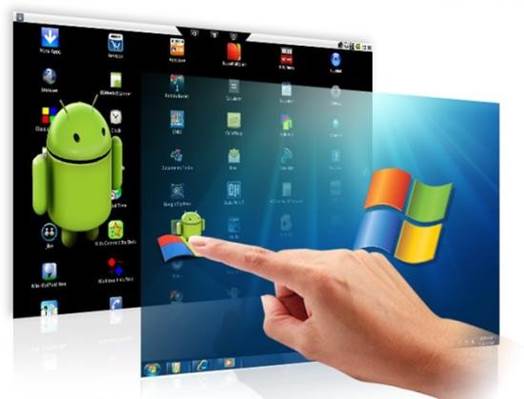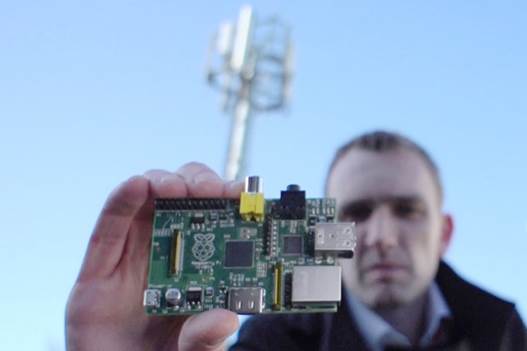Enjoy Windows apps on Android!
Here's news for techies with Android
gadgets who wish to have a Windows OS experience. You can now run Windows apps
on Android-based smartphones and tablets. Wine for Linux is soon going to
establish it on mobile devices and will be dubbed as Wine for Android. If you
are new to Wine, here is a brief introduction. Wine is open source software,
which allows Windows-based applications to run on UNIX-based operating systems.

Now
you can run all of the famous Android Apps on your Windows Pc. Including
Windows 7 and also Windows XP.
To be more precise, its compatibility layer
allows Windows applications to run on POSIX-compliant operating systems like
Linux, Mac OSX and BSD.
Wine functions differently; instead of
simulating internal Windows logic like a virtual machine or emulator, the open
source software translates Windows API calls into POSIX calls on the go, thus
offering better performance.
LibreOffice 4.0 released
At a time when Microsoft is planning to
bring out Office for Linux, LibreOffice has reached its version 4.0. The new
LibreOffice has been released by The Document Foundation. It has several major
improvements, like API changes and support for the Content Management
Interoperability Services (CMIS) standard. The new version also has better
import and export of native file formats for Microsoft Office programs, along
with further improvement of Visio import filters with the addition of the 2013
version.

At
a time when Microsoft is planning to bring out Office for Linux, LibreOffice
has reached its version 4.0.
One major addition in this release of
LibreOffice includes the first release of Impress Remote Control
App for Android, which is currently,
supported by some of the Linux distributions. The second release of the app is
expected to arrive soon, which will be supported on all platforms – Windows,
MacOS X, and all Linux distributions and binaries. LibreOffice Impress Remote
is a free remote control app for presentations. With this, you can control your
LibreOffice presentations from your Android smartphone.
The new version doesn't include many
changes in terms of visual appearance, compared to the 3.6.x LibreOffice
series.
However, LibreOffice 4.0 comes with several
tweaks in its user interface. The dialog boxes in this release are rendered.
Other additional improvements in the user interface include Unity integration
along with support of Firefox Themes (better known as Personas), which gives
LibreOffice a personalized look.
Now Android will help turbocharge
wireless routers!
droidifi is developing an Android firmware
upgrade for the latest Wi-Fi devices that unlocks their full potential, states
the Kickstarter page for Droidifi. The developers want to port the Android
smartphone operating system to wireless routers that can help power them
efficiently. It is expected that the first version will be supported on the
Cisco EA6500, Netgear R6300 and ASUS RT-AC66U.

Now
Android will help turbocharge wireless routers!
The above mentioned routers use IEEE
802.11ac to help them unleash Wi-Fi speeds of up to 1.7Gbit/s. In addition,
they consist of a Gigabit Ethernet switch, USB ports, and processing power,
memory and flash of 128 MB. The developers have even demonstrated an alpha
version of the firmware, which can be administered using a browser via an HTML5
interface. Basic wireless and Ethernet functionality has also been implemented,
but, say the developers, the alpha is still lacking a robust firewall, QoS
functionality, port forwarding and other features. Droidifi is based on Android
4.2.2 (JellyBean), with the Linux 3.6.11 kernel used in that version getting a
number of drivers added to it, stated a report.
According to the developers, a simple
firmware upgrade will add dozens of features and capabilities, including
downloadable Android apps. This potential would mean that the router will have
improved Wi-Fi power, simple connection of multiple wireless routers (mesh
networking), and the ability to run Android apps on the router.
OpenWRT and DD-WRT router firmware also
offer similar functionality to Droidifi. They both are Linux-based and can
function on a much wider range of wireless routers.
JavaScript to be the default language
for GNOME
JavaScript is becoming a force to reckon
with. GNOME developers have at last decided to stick to JavaScript to write
applications for the desktop environment. However, the developers are still
recommending C to write system libraries. “During the GNOME Developer
Experience Hackfest this week, one of the major goals we identified was the
need to pick a single language to give a simple answer to those who ask, 'How
do I write a GNOME app?' Our decision is to support JavaScript as the first
class language for GNOME application development”, read a blog posting by
Collabora engineer and GNOME developer, Travis Reitter.
Explaining the reason for choosing
JavaScript, Travis added, “Our language of choice needs to be dynamic and high
level. There is already momentum in the GNOME Project for JavaScript; it's used
in GNOME Shell and GNOME Documents. There's a lot of work going into the language
to make it especially fast, embeddable, and framework-agnostic. JavaScript is
increasingly being seen as a first class desktop programming language; it is
being used in Windows 8, in mobile platforms, and for local Web applications.
JavaScript is self-contained; it doesn't come with its own set of core
libraries, which makes it more convenient for us when integrating it into the
platform”.
Until now, there were no specific set of
tools to write an application for the GNOME desktop environment. With this
announcement, JavaScript will become the default language for GNOME
applications.
Google doles out Raspberry Pis to
students
In an effort to boost coding knowledge
among school children, Google has announced a generous grant, through which
15,000 Raspberry Pi Model B mini computers will reach school kids in the UK.
The Raspberry Pi Foundation will be giving away these mini computers after
selecting the children they believe would benefit from the Raspberry Pi.
Google’s executive chairman, Eric Schmidt, along with Raspberry Pi founder,
Eben Upton, visited Cambridge, and taught coding to local kids in a classroom
recently.

Google
doles out Raspberry Pis to students
With Google's grant, more students will
have access to the Raspberry Pi, which will help them get hands-on knowledge in
a varied range of educational open source code. As to how the Raspberry Pi
Foundation wills shortlist students, “We’re going to be working with Google and
six UK educational partners to find the kids who we think will benefit from
having their very own Raspberry Pi. CoderDojo, Code Club, Computing at Schools,
Generating Genius, Teach First and OCR will each be helping us identify those kids,
and will also be helping us work with them”, the Raspberry Pi site reported.
Initiatives like these indicate that big
companies like Google understand the importance of imparting quality education
to future innovators. With this grant, Google clearly showcased that it cannot
wait for governments to take serious steps to build our future. “We’re
incredibly grateful for Google’s help in something that we, like them, think is
of vital importance. We think they deserve an enormous amount of credit for
helping some of our future engineers and scientists find a way to a career
they’re going to love”, the posting on the Raspberry Pi site added.